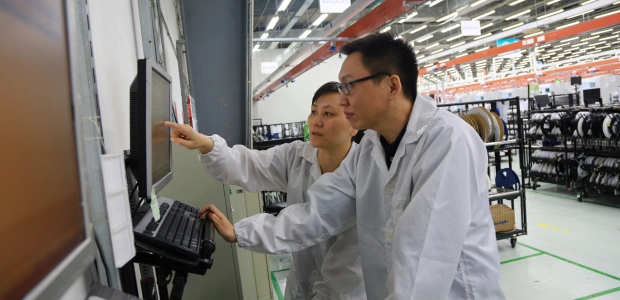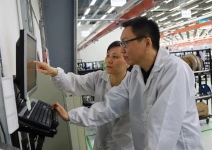
The Personal Side of Lean Manufacturing
The Manufacturing Process Optimization Program at the Jabil Shanghai plant paid dividends on many levels, including improving efficiency, cutting waste, and eliminating human error, plant managers reported. As a result, the initiative is being implemented at other Jabil Inc. sites.
- By Walter Garvin
- Nov 03, 2014
The foundation of lean manufacturing is kaizen, or continuous improvement. Although this principle usually targets manufacturing processes (reduced waste, greater efficiency, etc.) it can also extend to the people who plan and implement the lean projects. These individuals often grow professionally and personally as a result of the new skills and experiences they acquire by leading or participating in a project.
The award-winning Manufacturing Process Optimization Program at Jabil Shanghai not only showcases how lean manufacturing can cut costs and save time but also highlights how employees benefit from lean projects. By working together on projects such as this employees gain a stronger work ethic and an overall better work environment.
This major initiative lasted 16 months and involved nearly 700 individual employees in nine different departments. The broad scope of the project was a new experience for most participants, including the team leaders. Many people were excited about the opportunity to work on the facility's first cross-functional project, which gave them exposure to a wide range of tasks and procedures – sometimes through direct observation of other employees' work processes. Not only did this allow the employees to learn new tasks and procedures but it also provided them with the opportunity to learn more about what their fellow employees do every day, which helped to build a better social environment among them.
Tan Huan, section planning manager at the Jabil Shanghai plant, said his previous involvement with lean manufacturing had been limited to planning improvements. However, the Manufacturing Process Optimization Program allowed him to learn about other aspects of the plant's operation and gain insight in to how the others involved in the program view the lean initiative. "We needed to learn from the people actually doing the work and get their input on opportunities for improvement. The best way to accomplish this was by speaking with them directly and allowing employees from all aspects of the process to play a part in this project. I learned a great deal about processes, such as how materials are prepared in the warehouse, among other things by just listening, everyone seemed eager to share their views and teach."
Besides gaining exposure to other functions, core team members expanded their knowledge and skills by taking part in all five steps of the Lean DMAIC (define, measure, analyze, improve, control) methodology. Frank LuYing, plant industrial engineering manager at the Jabil Shanghai plant, explained, "Many of the members of the team, including myself, participated from the very beginning and went through the whole DMAIC process, which was a great way for us to learn and grow in our positions. I was especially interested in the improvement phase, because engineering is the owner of process design and maintenance and a big part of my job." Specifically, Frank and the IE automation team focused on designing and setting up the automatic guided vehicle that moves around the warehouse to collect materials, and also the milk run flow setup, which is a vehicle sent to each of the stop points through the routing line to pick up all the empty boxes.
Learning Valuable New Skills
 The DMAIC methodology was just one of the Lean Six Sigma tools employed in the project. In some cases, people were using these tools for the first time, so they had to learn this methodology. Tan Huan noted, "We used the Fishbone Diagram, role playing and other tools that I had only read about in books or heard about from coaches. This hands-on experience will continue to help me and the rest of the team in future projects and allow us to help others by passing on what we have learned from this project." Dai Lan, plant inventory controller at the Jabil Shanghai Plant, added, "For me, learning how to use Lean Six Sigma tools for the data analysis and improvement phases in particular was very interesting and is something I can use moving forward." While Ju Qing, workcell manager at the Jabil Shanghai Plant, pointed to the intensive brainstorming that the team used to uncover root causes of issues as a top skill he was able to take away from the project. (The Jabil Inc. photo at left shows Tan Huan (front), section manager of Planning, and Dai Lan, Inventory Control manager, discussing the project while working in the Jabil Shanghai facility.)
The DMAIC methodology was just one of the Lean Six Sigma tools employed in the project. In some cases, people were using these tools for the first time, so they had to learn this methodology. Tan Huan noted, "We used the Fishbone Diagram, role playing and other tools that I had only read about in books or heard about from coaches. This hands-on experience will continue to help me and the rest of the team in future projects and allow us to help others by passing on what we have learned from this project." Dai Lan, plant inventory controller at the Jabil Shanghai Plant, added, "For me, learning how to use Lean Six Sigma tools for the data analysis and improvement phases in particular was very interesting and is something I can use moving forward." While Ju Qing, workcell manager at the Jabil Shanghai Plant, pointed to the intensive brainstorming that the team used to uncover root causes of issues as a top skill he was able to take away from the project. (The Jabil Inc. photo at left shows Tan Huan (front), section manager of Planning, and Dai Lan, Inventory Control manager, discussing the project while working in the Jabil Shanghai facility.)
One benefit of the practical experience gained by utilizing these tools is that employees can extend their use to individual functional areas. Ju Qing said, "The techniques we put into practice during this project can be applied to my work function to increase efficiency of information flow, reduce manual work and avoid human error." Xu Yu Feng, a planning manager at the Jabil Shanghai plant and one of the project leaders, agreed. "The increased understanding and experience with Lean Six Sigma that I gained from this project will make it easier for me and others involved in the project to find opportunities for improvement moving forward. I have strengthened my skills in working with many different people to find solutions."
The team members are also seeing the results of the project in their particular work functions. Jessica Li, purchasing manager at the Jabil Shanghai plant, stated, "The changes made during the project are having a positive impact on purchasing, including all the way up the value chain like the efficiency of buyers and vendor quality. The entire purchasing team values our lean culture of continuous improvement because they can see its benefits every day." Referring to the complete elimination of paper, thanks to the new ePull system, Ju Qing said, "This improvement has solved the problem of low efficiency and human error that we previously experienced with paper-based systems." Dai Lan added, "The shift from manual to system control of materials provides a clear, accurate status for the plant."
Further, they are pleased that their work is being replicated at other Jabil Inc. facilities. Jessica Li said, "This kind of problem and waste is occurring in other Jabil facilities, as well. Our project can be duplicated at other sites to extend its benefits to more employees."
Another important thing is that many participants feel that the project strengthened their professional qualifications and provided visibility among senior executives. Jack Chen, Shanghai plant lean six sigma manager and the other project leader, noted, "This cross-functional initiative gave me valuable project management experience, especially in the area of communications. I had the opportunity to help employees better understand the benefits of Lean and see the contribution of different functional areas in achieving shared goals." He also improved his skills in team building, particularly in motivating people. "As a leader, I was responsible for finding resources, obtaining information and guiding the pace of the project – especially during root cause analysis – to be sure we thoroughly evaluated all the data. It taught me a lot about the power of effective teamwork." Ju Qing echoed that thought: "Teamwork is the soul of success."
Overall, the project was a huge success not only for Jabil as a company, but also on a personal front and ultimately its customers. This project allowed individuals to work together to accomplish specific goals and helped strengthen their skills. Additionally, they were able to take what they learned from this experience and continue to apply these lean six sigma practices to their everyday performance as well as teach other employees how they can help them in their facilities. Not only does the majority of the Jabil Shanghai plant team who participated in this project feel they have achieved great success and learned a lot, they would also jump at the chance to be a part of another project if the opportunity presented itself.
Walter Garvin is Vice President, Lean Six Sigma, for Jabil Inc. This article concerns a project at one of its facilities in Shanghai, China. Jabil Inc. is based in St. Petersburg, and is an electronic product solutions company providing comprehensive electronics design, manufacturing and aftermarket product management services to global electronics and technology companies.